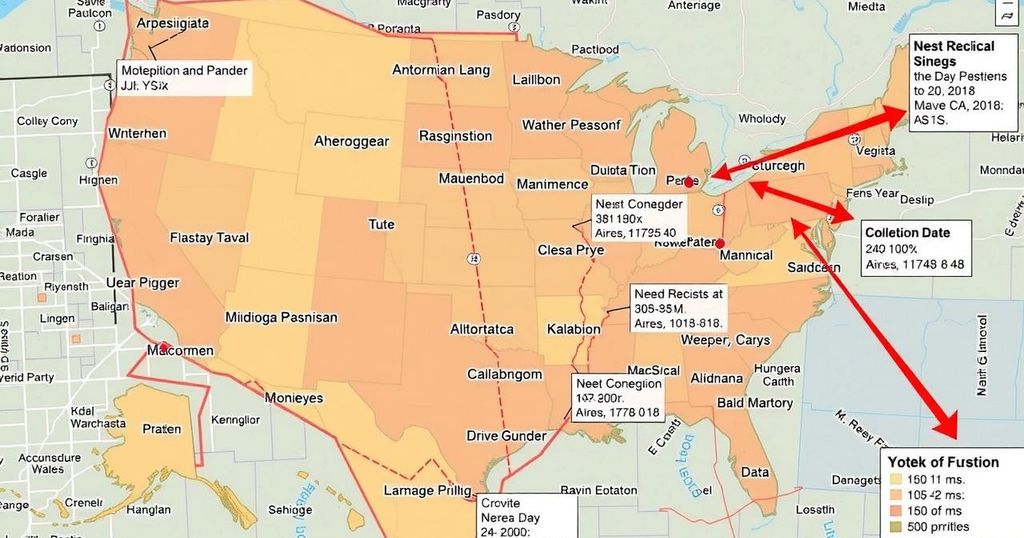Assessing the Chaotic Landscape of Election Disinformation

The article examines the current chaotic landscape of election disinformation, exacerbated by influential figures like Donald Trump and Elon Musk. It explores the contributing factors, including legal attacks on disinformation countermeasures, reduced content moderation by social media platforms, and the rise of organizations undermining electoral integrity. The impending election is expected to witness an escalation of conspiracy theories, impacting public trust in elections and the safety of officials.
In recent months, the proliferation of disinformation, particularly in the political arena, has become alarmingly chaotic. Prominent figures such as Donald Trump, Elon Musk, and Marjorie Taylor Greene have significantly contributed to the dissemination of misleading information, especially surrounding critical events like hurricanes and upcoming elections. Elaine Godfrey, a political reporter, has expressed concerns regarding the current environment, highlighting a convergence of factors that amplify the spread of conspiracy theories and false narratives. The aftermath of Hurricanes Helene and Milton demonstrated that online chaos is merely a precursor to what may unfold during the elections. In the wake of these hurricanes, disinformation surrounding recovery efforts flourished, showcasing a concerning trend. Godfrey points out that significant changes since the last election, including legal assaults on disinformation combat efforts and the emergence of organizations that undermine electoral integrity, have fostered an environment conducive to misinformation. Moreover, the reduction of content moderation by major social media platforms exacerbates the situation, allowing false narratives to proliferate unchecked. The interplay of geopolitical conflicts and advances in generative AI technology have converged to create fertile ground for disinformation. Godfrey emphasizes that many recent conspiracy theories lack even a kernel of truth, with instances of outrageous claims regarding hurricanes and election processes on social media platforms. The upcoming election cycle is predicted to witness an escalation of disinformation, particularly concerning polling operations and the legitimacy of electoral processes. The consequences of such disinformation are severe, not only for public perception of election integrity but also for the safety of officials involved in emergency responses and electoral processes. Individuals influenced by these false narratives may avoid necessary governmental assistance or act upon unfounded fears related to electoral fraud. Godfrey underscores that this situation places legitimate election workers in precarious positions, as they face undue pressure from misled constituents. As the conversation shifts to the role of influential figures like Elon Musk in perpetuating disinformation, Godfrey acknowledges Musk’s substantial following and his ability to amplify misleading claims through the social media platform X. The potential ramifications of such actions on public discourse and electoral outcomes are considerable, especially as the election approaches. Although the current landscape displays a greater awareness of disinformation tactics compared to past elections, the ongoing challenges remain significant, with widespread concerns that disinformation campaigns will only intensify. In summation, the chaotic state of election-related disinformation presents profound risks to democratic processes and public safety. As the election nears, vigilance and critical examination of information are paramount to mitigating the impact of these deceptive narratives. Godfrey asserts, “Disinformation is meant to incite fear and muddy the waters. If you see something on social media that sparks an emotional reaction like fear or anger… check it out.”
The article discusses the increasing chaos surrounding election disinformation, particularly in light of recent hurricane events and the impact of influential individuals on social media. It highlights how significant changes and developments since the 2020 elections have created an environment conducive to the proliferation of false narratives. The discussion extends to the real-world implications of disinformation, particularly regarding public trust in elections and the safety of officials processing emergency responses. The concerns raised in this analysis reflect broader apprehensions about the integrity of democratic processes in the face of rampant misinformation and highlight the urgent need for critical engagement with the information encountered online.
In conclusion, the escalating disorder surrounding election disinformation poses considerable threats to public trust in democratic processes and the safety of individuals involved in emergency and electoral management. Continued vigilance, improved content moderation, and engagement with factual information are essential to combat the detrimental effects of misinformation as the election approaches. Prominent figures, particularly on social media, must be held accountable for the accuracy of the claims they amplify, to ensure the integrity of public discourse remains intact.
Original Source: www.theatlantic.com






